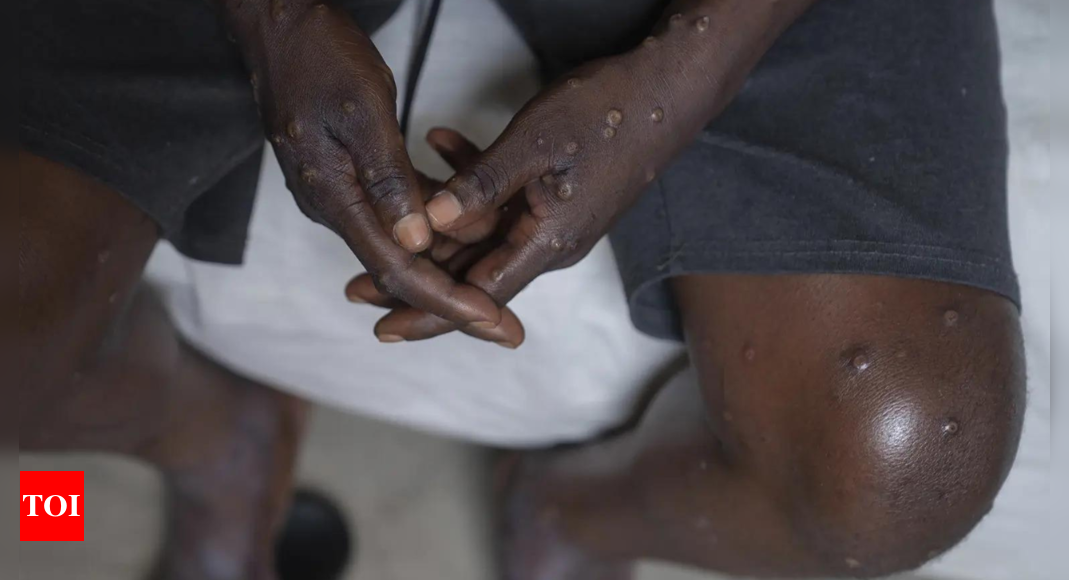
The World Health Organisation (WHO) announced on Wednesday that the escalating transmission of mpox in Africa constitutes a global health emergency, warning that the virus could potentially spread across international borders.
The declaration was made by WHO director-general Tedros Adhanom Ghebreyesus following a convening of the UN health agency’s emergency committee. This announcement comes just a day after the Africa Centers for Disease Control and Prevention classified mpox as a public health emergency on the continent.
What is mpox?
Scientists first discovered mpox, formerly known as monkeypox, in 1958 when they observed outbreaks of a “pox-like” disease among monkeys.Prior to recent events, the majority of human cases occurred in central and West Africa, primarily affecting individuals who had close contact with infected animals.
In 2022, the virus was confirmed to spread via sex for the first time and triggered outbreaks in more than 70 countries across the world that had not previously reported mpox.
Mpox is a member of the same viral family as smallpox, but it typically causes less severe symptoms, including fever, chills, and body aches. In more serious cases, individuals may develop lesions on various parts of the body, such as the face, hands, chest, and genitals.
Where was it first discovered
WHO announced that mpox, a viral disease, has been detected in four East African nations for the first time: Burundi, Kenya, Rwanda, and Uganda, AP reported,
According to the organization, these outbreaks were connected to the ongoing epidemic in Congo. The WHO Director-General, Tedros Adhanom Ghebreyesus, expressed concern about the potential for the disease to spread further within Africa and to other regions.
In a separate development, health authorities in the Ivory Coast and South Africa have reported outbreaks of a different strain of mpox, which is considered less severe than the one that caused a global outbreak in 2022, infecting nearly 100,000 people worldwide.
What is the global threat
The novel mpox variant discovered in Congo has the potential to spread internationally, as is the case with other contagious diseases. Instances of this variant have already been reported in four additional East African nations.
Authorities assessed the risk to the general population as “very low” and anticipated occasional imported cases to persist.
In contrast to Covid-19 or measles, mpox is not transmitted through the air and usually requires close, skin-to-skin contact for transmission.
First case in Sweden
Sweden has confirmed its first case of mpox, a viral infection that spreads through close contact. This follows the World Health Organization’s declaration of mpox as a global public health emergency after an outbreak in the Democratic Republic of Congo spread to other countries.
Health and Social Affairs Minister Jakob Forssmed announced the confirmation on Thursday afternoon. The development marks Sweden’s first encounter with the more severe type of mpox identified as Clade I.
What does emergency declaration signify
WHO’s announcement of an emergency is intended to galvanize support from nations and philanthropic organizations. However, past declarations have yielded inconsistent global responses.
Africa CDC Director General Dr. Jean Kaseya stated that the agency’s proclamation of a public health emergency aimed “to mobilize our institutions, our collective will and our resources to act swiftly and decisively.”He called upon Africa’s global allies for assistance, asserting that the worsening situation in Africa had been largely disregarded.
How is current outbreak different from 2022 epidemic
During the global outbreak of mpox in 2022, gay and bisexual men made up the vast majority of cases and the virus was mostly spread through close contact, including sex, the Howard Hughes Medical Institute’s Science and Educational Media Group in collaboration with AP reported.
In 2022, the worldwide mpox outbreak primarily affected gay and bisexual men, with the virus mainly transmitted through close contact, including sexual activity.
However, the situation in Africa, particularly in Congo, presents a different picture. Children under the age of 15 constitute over 70% of mpox cases and account for 85% of fatalities in the country.
Save the Children’s Congo director, Greg Ramm, expressed concern about the potential spread of mpox in overcrowded refugee camps “crammed into tents in unsanitary conditions.” He said the country’s health system was already “collapsing” under the strain of malnutrition, measles and cholera.
What’s happening in Africa
According to WHO, Africa has reported over 14,000 cases and 524 deaths attributed to mpox this year, surpassing the figures from the previous year.
So far Congo accounts for more than 96% of all reported cases and deaths. Researchers are alarmed by the emergence of a new variant of the disease in Congo that may exhibit increased transmissibility among individuals.
The Africa CDC has reported a significant increase in mpox cases across the continent. Compared to the same period in the previous year, the number of cases has risen by 160%, and fatalities have climbed by 19%. This year scientists reported the emergence of a new form of mpox in a Congolese mining town that can kill up to 10 per cent of people, AP reported.
How can it be stopped?
The mpox outbreak of 2022, which affected numerous nations, was primarily contained in wealthy countries through the utilization of vaccines and treatments, as well as encouraging individuals to avoid high-risk behaviors. However, these resources have been scarcely accessible in Africa.
According to Marks from the London School of Hygiene and Tropical Medicine, vaccination, including immunization against smallpox, a related virus, would likely be beneficial. “We need a large supply of vaccine so that we can vaccinate populations most at risk,” he said, specifying that this would encompass sex workers, as well as children and adults residing in outbreak-affected areas, as per AP reports.
The Congolese government has requested 4 million doses, primarily for young children, but Cris Kacita Osako, the coordinator of Congo’s Monkeypox Response Committee, stated that no doses have been received so far.
(With input from agencies)
The declaration was made by WHO director-general Tedros Adhanom Ghebreyesus following a convening of the UN health agency’s emergency committee. This announcement comes just a day after the Africa Centers for Disease Control and Prevention classified mpox as a public health emergency on the continent.
What is mpox?
Scientists first discovered mpox, formerly known as monkeypox, in 1958 when they observed outbreaks of a “pox-like” disease among monkeys.Prior to recent events, the majority of human cases occurred in central and West Africa, primarily affecting individuals who had close contact with infected animals.
In 2022, the virus was confirmed to spread via sex for the first time and triggered outbreaks in more than 70 countries across the world that had not previously reported mpox.
Mpox is a member of the same viral family as smallpox, but it typically causes less severe symptoms, including fever, chills, and body aches. In more serious cases, individuals may develop lesions on various parts of the body, such as the face, hands, chest, and genitals.
Where was it first discovered
WHO announced that mpox, a viral disease, has been detected in four East African nations for the first time: Burundi, Kenya, Rwanda, and Uganda, AP reported,
According to the organization, these outbreaks were connected to the ongoing epidemic in Congo. The WHO Director-General, Tedros Adhanom Ghebreyesus, expressed concern about the potential for the disease to spread further within Africa and to other regions.
In a separate development, health authorities in the Ivory Coast and South Africa have reported outbreaks of a different strain of mpox, which is considered less severe than the one that caused a global outbreak in 2022, infecting nearly 100,000 people worldwide.
What is the global threat
The novel mpox variant discovered in Congo has the potential to spread internationally, as is the case with other contagious diseases. Instances of this variant have already been reported in four additional East African nations.
Authorities assessed the risk to the general population as “very low” and anticipated occasional imported cases to persist.
In contrast to Covid-19 or measles, mpox is not transmitted through the air and usually requires close, skin-to-skin contact for transmission.
First case in Sweden
Sweden has confirmed its first case of mpox, a viral infection that spreads through close contact. This follows the World Health Organization’s declaration of mpox as a global public health emergency after an outbreak in the Democratic Republic of Congo spread to other countries.
Health and Social Affairs Minister Jakob Forssmed announced the confirmation on Thursday afternoon. The development marks Sweden’s first encounter with the more severe type of mpox identified as Clade I.
What does emergency declaration signify
WHO’s announcement of an emergency is intended to galvanize support from nations and philanthropic organizations. However, past declarations have yielded inconsistent global responses.
Africa CDC Director General Dr. Jean Kaseya stated that the agency’s proclamation of a public health emergency aimed “to mobilize our institutions, our collective will and our resources to act swiftly and decisively.”He called upon Africa’s global allies for assistance, asserting that the worsening situation in Africa had been largely disregarded.
How is current outbreak different from 2022 epidemic
During the global outbreak of mpox in 2022, gay and bisexual men made up the vast majority of cases and the virus was mostly spread through close contact, including sex, the Howard Hughes Medical Institute’s Science and Educational Media Group in collaboration with AP reported.
In 2022, the worldwide mpox outbreak primarily affected gay and bisexual men, with the virus mainly transmitted through close contact, including sexual activity.
However, the situation in Africa, particularly in Congo, presents a different picture. Children under the age of 15 constitute over 70% of mpox cases and account for 85% of fatalities in the country.
Save the Children’s Congo director, Greg Ramm, expressed concern about the potential spread of mpox in overcrowded refugee camps “crammed into tents in unsanitary conditions.” He said the country’s health system was already “collapsing” under the strain of malnutrition, measles and cholera.
What’s happening in Africa
According to WHO, Africa has reported over 14,000 cases and 524 deaths attributed to mpox this year, surpassing the figures from the previous year.
So far Congo accounts for more than 96% of all reported cases and deaths. Researchers are alarmed by the emergence of a new variant of the disease in Congo that may exhibit increased transmissibility among individuals.
The Africa CDC has reported a significant increase in mpox cases across the continent. Compared to the same period in the previous year, the number of cases has risen by 160%, and fatalities have climbed by 19%. This year scientists reported the emergence of a new form of mpox in a Congolese mining town that can kill up to 10 per cent of people, AP reported.
How can it be stopped?
The mpox outbreak of 2022, which affected numerous nations, was primarily contained in wealthy countries through the utilization of vaccines and treatments, as well as encouraging individuals to avoid high-risk behaviors. However, these resources have been scarcely accessible in Africa.
According to Marks from the London School of Hygiene and Tropical Medicine, vaccination, including immunization against smallpox, a related virus, would likely be beneficial. “We need a large supply of vaccine so that we can vaccinate populations most at risk,” he said, specifying that this would encompass sex workers, as well as children and adults residing in outbreak-affected areas, as per AP reports.
The Congolese government has requested 4 million doses, primarily for young children, but Cris Kacita Osako, the coordinator of Congo’s Monkeypox Response Committee, stated that no doses have been received so far.
(With input from agencies)









